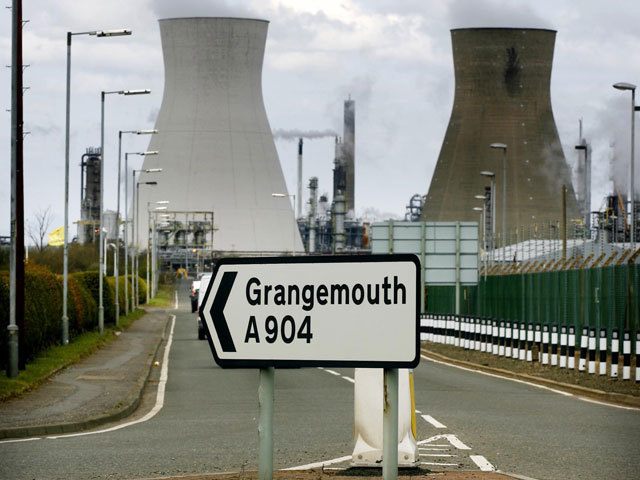
Grangemouth refinery workers could soon accept upgraded redundancy terms and an above inflation pay rise to encourage them to stay on at the site until 2025.
In November, owner Petroineos announced Scotland’s last remaining oil refinery at the Grangemouth site could cease operations as soon as 2025 following an 18 month process to transition to a fuel import terminal.
Petroineos – a joint venture between PetroChina and Ineos – blamed market pressures and the energy transition for the decision.
In response, union leaders called for the site to be nationalised and called the closure “a kick in the teeth for the workforce and the community”.
The committee appearance came on the same day as Scotland’s Just Transition Commission warned “significant” further action is needed to support the workforce.
Grangemouth ‘jobs on a timer’
In a meeting of the Holyrood Economy and Fair Work Committee yesterday, MSPs pressed Grangemouth executives on what the company is doing to retain highly skilled staff who have “effectively been told their job is on a timer”.
Petroineos head of legal and external affairs Iain Hardie said the company has had advanced discussions with unions about financial incentives to keep workers on site through the transition process.
“Together with the unions and employee forums, we’ve had very advanced discussions with them and, notwithstanding that we’re not in a formal consultation because we’ve not started the closure process, we have put in place via the annual pay review a series of enhanced measures to protect them,” Mr Hardie said.
“As of yesterday, I understand the unions will be recommending to their members an upgrade to their redundancy terms as well as an above inflation pay rise.”
Union aims to retain and protect jobs
A spokesperson for Unite told Energy Voice wage negotiations with Petroineos were underway before the company announced its plans to transition away from oil refining at Grangemouth.
“The negotiations recently concluded and this involved an increase to pay and other terms and conditions,” the spokesperson said.
“Like in previous years’ negotiations, an increase in redundancy pay was a part of the 2024 proposal which was accepted by the members.
“Unite remains focused on the aim to retain and protect jobs at the refinery.”
Petroineos confirms likely job losses
Responding to questions at Holyrood on the number of jobs set to be lost, Mr Hardie provided some clarity on how many are likely to be affected.
He said there are approximately 500 people currently employed at the Grangemouth site, with around 100 ongoing roles anticipated to be needed once the transition to a terminal.
Of those 400 jobs set to be lost, Mr Hardie said around 100 people will be eligible for retirement.
An additional 50 employees will be required for decommissioning and demolition of the Grangemouth site for a period of up to three years following spring 2025.
Supply chain jobs impact
During the committee appearance, Mr Hardie was asked multiple times by committee members what the impact of closing the Grangemouth refinery operations would have on supply chain jobs in the local area.
Mr Hardie said Petroineos had not done a calculation on the supply chain impact but said typical modelling done within the industry assumed a multiple of seven for affected jobs.
“The typical modelling number uses a multiple of seven, that’s taken from the Chemical Industries Association,” Mr Hardie said in response to Conservative MSP Stephen Kerr asking about the potential for “thousands” of jobs losses in the Falkirk Area.
“But I think that belies the fact that within that number, not everyone involved in the supply chain works exclusively for the manufacturing business and not every business will have no part to play in the future transition,” Mr Hardie said.
Petroineos is already engaged in discussions with Falkirk Council and the Scottish Government on measures to reduce the impact on the local community, Mr Hardie said.
Petroineos says no decision on closure date
Responding to questions on exactly when the refinery at Grangemouth will close, Mr Hardie said Petroineos has not made a final decision and operations are “business as usual” at this stage.
He reiterated that at this stage the company has only confirmed it will take around 18 months to complete the transition process, which will involve converting the Finnart terminal on the West Coast of Scotland into a bulk diesel import node.
Meanwhile, Grangemouth jetty will be modified to receive kerosene and gasoline, plus diesel if required.
Mr Hardie said the split is designed to “de-bottleneck access at Grangemouth jetty” with the plan focused on fuel resilience and security.
Grangemouth ‘Just Transition’ in action
During questioning, Mr Hardie and INEOS Grangemouth sustainability director Colin Pritchard reiterated the refinery closure will not affect planning for a possible biorefinery at the site.
Petroineos is exploring the possibility of manufacturing biodiesel and sustainable aviation fuels on vacant land at Grangemouth located within the Forth Green Freeport bid.
Plans around the possible production of blue hydrogen at Grangemouth with associated carbon capture through the North Sea Acorn project are also unaffected.
Mr Hardie said it is “equally important that in parallel with the cessation of the refinery that we continue our studies around biorefining”.
“Because ultimately, we talk about the ‘just transition’, but this is the just transition in action, and there’s inevitability about us having to migrate from a fossil [fuel] based economy to a non-fossil [fuel] economy,” he said.
Grangemouth employees are “absolutely at the heart of our strategy”, Mr Hardie said, but acknowledged news of the refinery closure would have been unsettling for them.
“It’s for exactly that reason we need to give them as much financial security as we can at this time in order that we can continue to operate as a refinery for so long as we need to,” he said.
ScotGov Just Transition plan
Appearing before the committee following Mr Hardie, Scotland’s Economy, Fair Work and Energy Secretary Neil Gray told MSPs a specific just transition plan for Grangemouth will be published in spring next year.
Mr Gray said ministers wanted “to see as many people as possible retained in the energy sector and elsewhere”.
He said the work being doing particularly in the supply chain for offshore wind projects could demonstrate to the “highly skilled and valued workforce” that they could have “a strong energy-related career in green industries here in Scotland”.
The Scottish government has set up a fund to invest £500m in the just transition over 10 years, with the first round of grants announced in September.
Recommended for you


 © DC Thomson & Co. Ltd
© DC Thomson & Co. Ltd © Supplied by Twitter/Andy Willo
© Supplied by Twitter/Andy Willo
 © Supplied by Arcola Energy
© Supplied by Arcola Energy